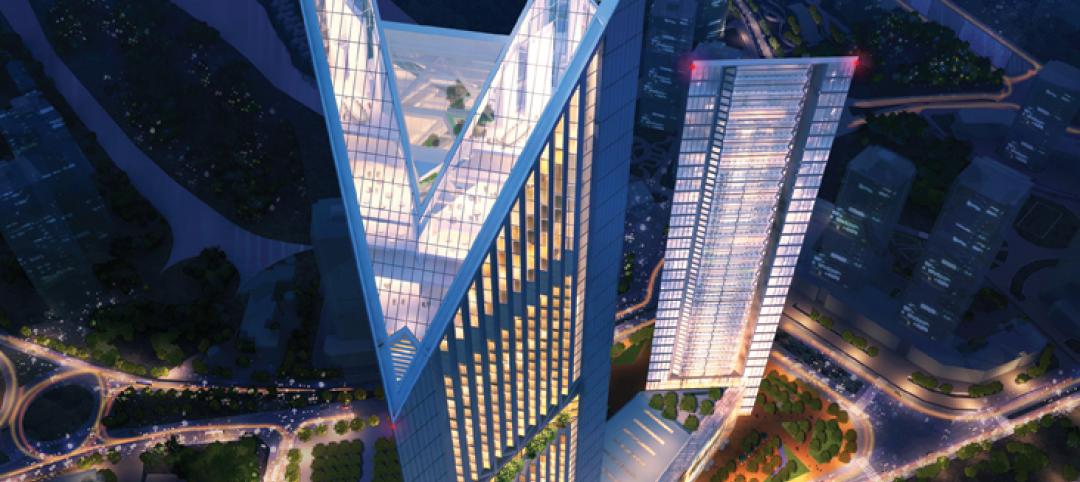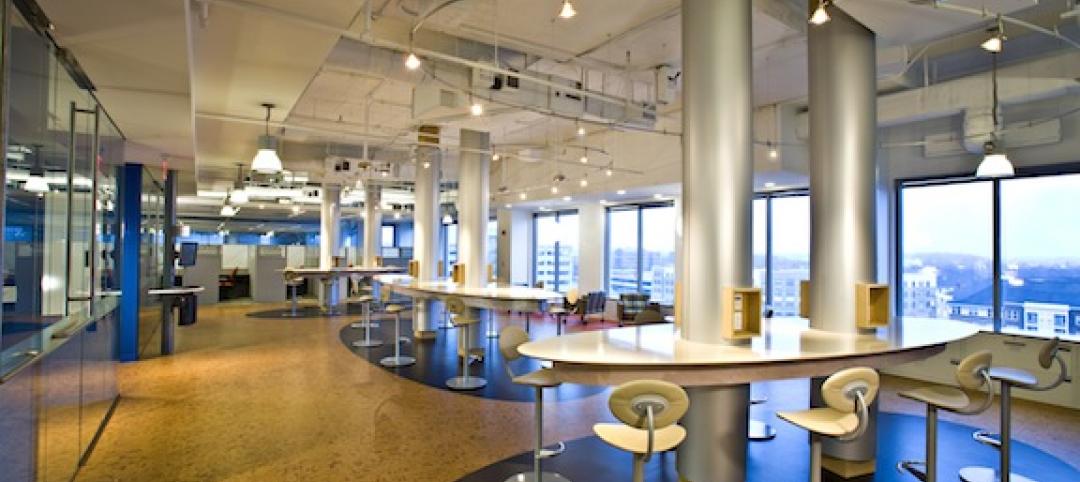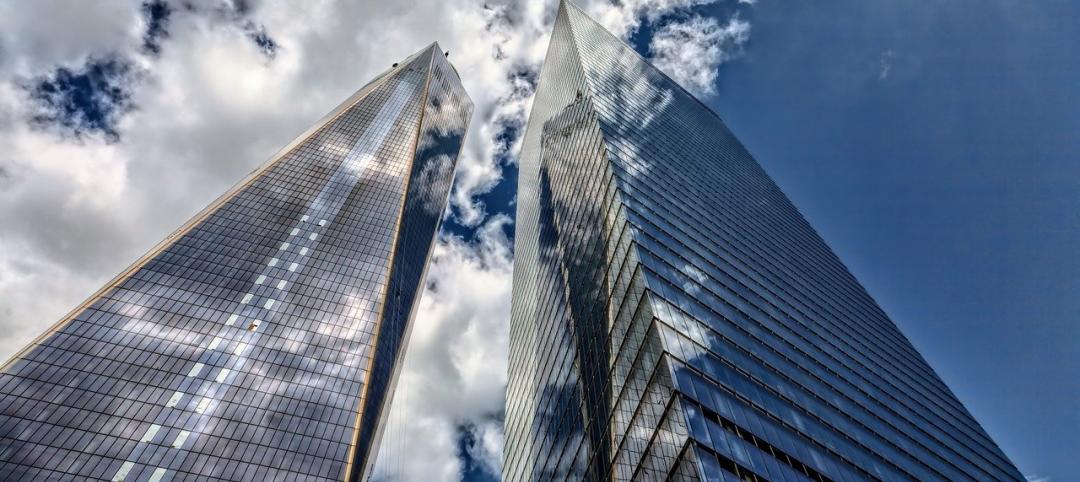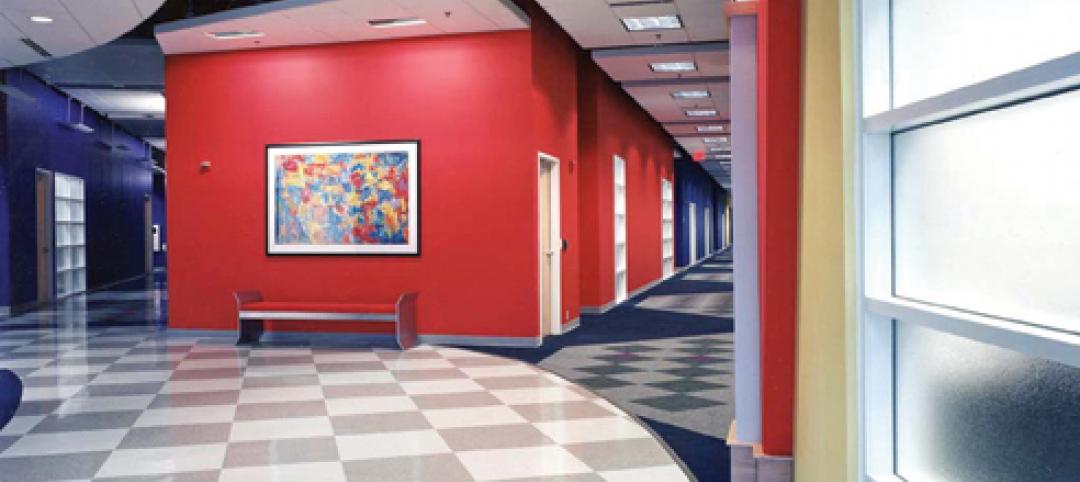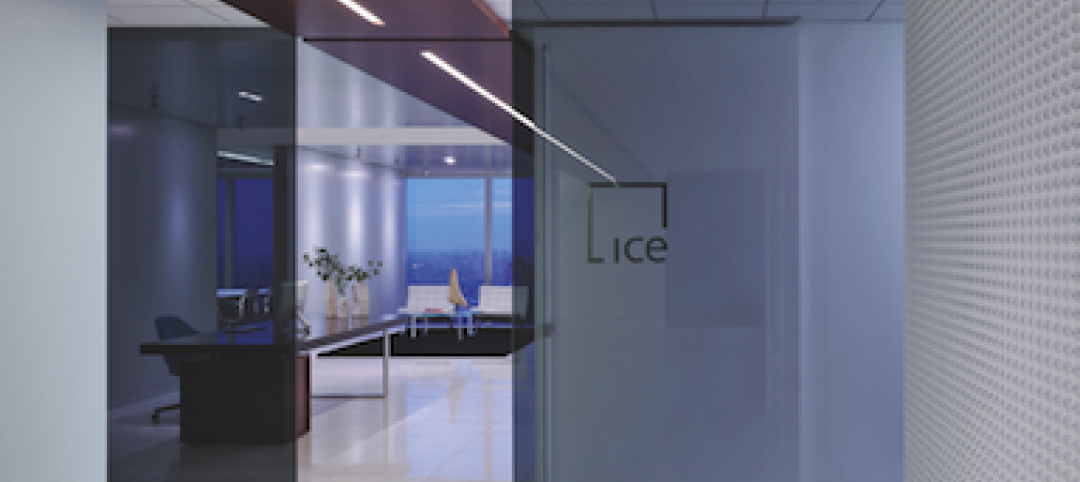Employees place more value on physical elements that support well-being and convenience—such as natural light, views of the outdoors, and food—than on “service” amenities like fitness centers and onsite childcare.
That’s one of the findings of a new survey that examines how workplace experience can boost employee engagement. CBRE’s Workplace practice analyzed responses from more than 1,600 employees in the U.S. and Canada to gauge aspects of the work environment that impact their employee experience.
Future Workplace, an HR advisory and research firm, conducted the survey in partnership with View Inc., a technology company that focuses on creating smart and connected buildings. They sent the survey to employees of all ages, ranging from Generation Zers (4%), millennials (40%) and Gen Xers (38%) to baby boomers (17%) and even the Silent Generation (less than 1% of responses).
There was only marginal generational variation in workplace dissatisfaction levels. Indeed, the majority of those polled (71%) report feeling involved in and enthusiastic about their work and organizations. More than half (57%) said they would recommend their company to someone seeking work.
But the survey wondered just how deep this enthusiasm is, especially when 51% of respondents exhibit low engagement (at best, they are neutral about their workplaces), and 35% exhibit only moderate engagement.
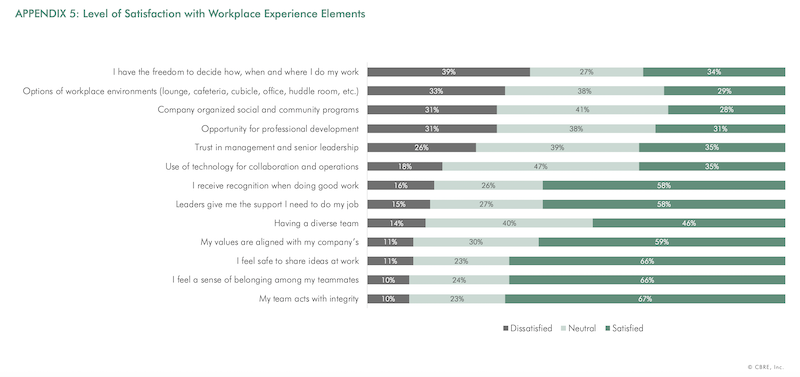
The survey shows that a sizable portion of workers still aren't all that satisfied with their workplace's flexibility or amenities.
The most valued perks or amenities in offices include view of outdoors and natural light (which 53% of respondents cited), an onsite café (44%), a kitchen (37%), and open office space (28%). “Integrated strategically, food is a key element of fostering community and culture within an organization,” the report states. There are also any number of variables that can impact employee engagement, including trust in management and its willingness to listen to new ideas, shared values, opportunities for career advancement, leadership support, and workplace flexibility.
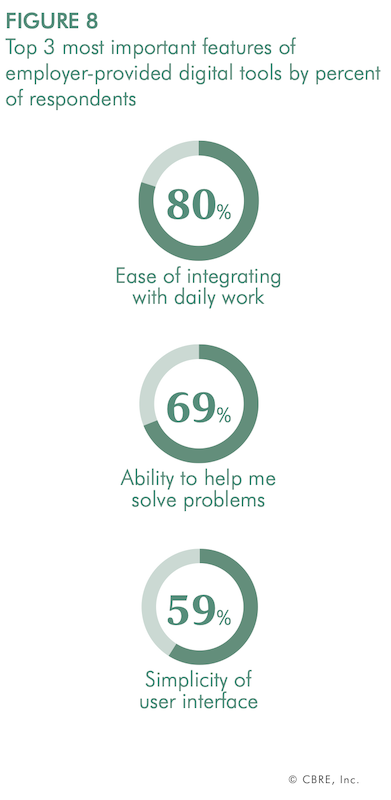
Regardless of how tech savvy they are, employees still want simplicity in the digital tools they use at the office.
The results of the survey reveal that to drive increased engagement and organizational impact, workplace investment should target creating an emotional connection between employees and their employers. When leveraged, the physical environment provides an opportunity to reinforce these emotional elements of workplace experience.
“Trust is reinforced by environments that make employees’ impact and work processes visible. Values are signaled by space allocation hierarchy and investment in experiences that support culture, well-being and ease of work,” says Nina Charnotskaia, Senior Director of CBRE’s Workplace practice.
The survey confirms a trend that’s been happening for a while in workplaces across the country: The office is no longer simply a place for work; it is a destination where employees connect, feel a sense of community, understand organizational objectives and feel their impact on a greater whole.
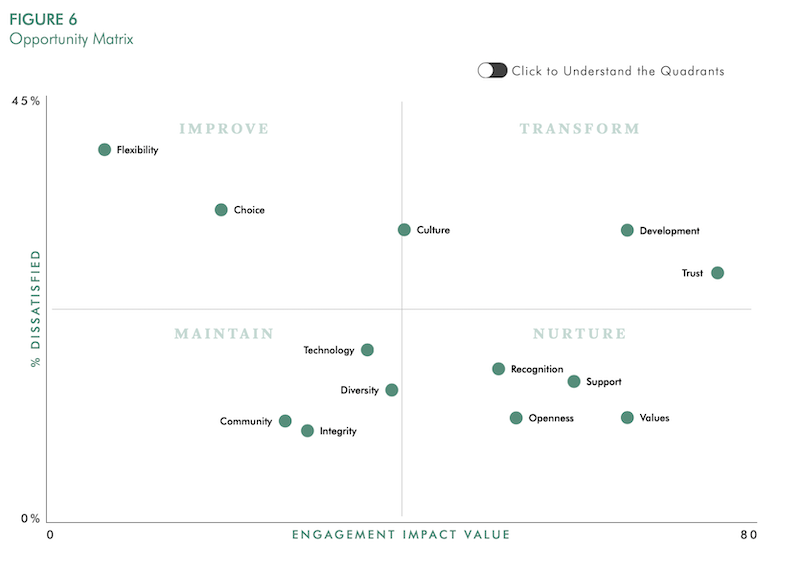
This “Opportunity Matrix” prioritizes investments toward employee engagement.
CBRE created an “Opportunity Matrix” to guide companies’ prioritization of investment for impact into four actionable quadrants: Improve, Transform, Maintain, and Nurture.
For example, the “transform” quadrant highlights the most impactful elements of experience, including trust in leadership, opportunities for professional development, and experiences that drive organizational culture. These elements need investment to achieve their greatest potential in transforming engagement.
The “nurture” quadrant suggests that employees already feel recognized, supported and valued at work, and they are engaged as a result. These experiences must be nurtured and held to the standards employees are accustomed to or they could challenge engagement in the future.
Treating the workplace as a tool that reflects and supports organizational values changes the priority of certain workplace investments. Commercial real estate leaders must understand what each investment decision is “saying” to employees and optimize it for the intended message.
“If senior management can impact employee engagement positively, it can influence better recruitment and retention of talent,” says Damla Gerhart, Senior Managing Director of CBRE’s Workplace practice.
Related Stories
| Dec 17, 2010
Vietnam business center will combine office and residential space
The 300,000-sm VietinBank Business Center in Hanoi, Vietnam, designed by Foster + Partners, will have two commercial towers: the first, a 68-story, 362-meter office tower for the international headquarters of VietinBank; the second, a five-star hotel, spa, and serviced apartments. A seven-story podium with conference facilities, retail space, restaurants, and rooftop garden will connect the two towers. Eco-friendly features include using recycled heat from the center’s power plant to provide hot water, and installing water features and plants to improve indoor air quality. Turner Construction Co. is the general contractor.
| Dec 13, 2010
Energy efficiency No. 1 priority for commercial office tenants
Green building initiatives are a key influencer when tenants decide to sign a commercial real estate lease, according to a survey by GE Capital Real Estate. The survey, which was conducted over the past year and included more than 2,220 office tenants in the U.S., Canada, France, Germany, Sweden, the UK, Spain, and Japan, shows that energy efficiency remains the No. 1 priority in most countries. Also ranking near the top: waste reduction programs and indoor air.
| Dec 7, 2010
Hot rumor: Norman Foster designing Apple’s new campus
Lord Norman Foster, reportedly has been selected to design Apple’s new campus in Cupertino, Calif. If the news is true, Foster is a good match for Apple say experts. Foster built his celebrity by marrying big gestures to technological wizardry. And, unlike some starchitects, he has glommed onto the environmental revolution—something Apple has made a point of embracing, too.
| Dec 7, 2010
Product of the Week: Petersen Aluminum’s column covers used in IBM’S new offices
IBM’s new offices at Dulles Station West in Herndon, Va., utilized Petersen’s PAC-1000 F Flush Series column covers. The columns are within the office’s Mobility Area, which is designed for a mobile workforce looking for quick in-and-out work space. The majority of workspaces in the office are unassigned and intended to be used on a temporary basis.
| Nov 16, 2010
Calculating office building performance? Yep, there’s an app for that
123 Zero build is a free tool for calculating the performance of a market-ready carbon-neutral office building design. The app estimates the discounted payback for constructing a zero emissions office building in any U.S. location, including the investment needed for photovoltaics to offset annual carbon emissions, payback calculations, estimated first costs for a highly energy efficient building, photovoltaic costs, discount rates, and user-specified fuel escalation rates.
| Nov 3, 2010
Public works complex gets eco-friendly addition
The renovation and expansion of the public works operations facility in Wilmette, Ill., including a 5,000-sf addition that houses administrative and engineering offices, locker rooms, and a lunch room/meeting room, is seeking LEED Gold certification.
Office Buildings | Nov 3, 2010
11 tips for office renovation success
Only after you’ve done your homework on these critical success factors can you determine if you can produce a successful office renovation project for your client.
| Nov 2, 2010
11 Tips for Breathing New Life into Old Office Spaces
A slowdown in new construction has firms focusing on office reconstruction and interior renovations. Three experts from Hixson Architecture Engineering Interiors offer 11 tips for office renovation success. Tip #1: Check the landscaping.
| Oct 13, 2010
Editorial
The AEC industry shares a widespread obsession with the new. New is fresh. New is youthful. New is cool. But “old” or “slightly used” can be financially profitable and professionally rewarding, too.
| Oct 13, 2010
Modern office design accentuates skyline views
Intercontinental|Exchange, a Chicago-based financial firm, hired design/engineering firm Epstein to create a modern, new 31st-floor headquarters.



